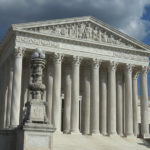WASHINGTON (RNS)—For nearly five decades, abortion opponents held two truths to be self-evident: Abortion ends the life of a human being, and women who have an abortion are “second victims.”
Now, with Roe v. Wade overturned, a small but influential group of abortion foes believes women who have abortions should be prosecuted as criminals. Known as abortion abolitionists, they want to ban abortion with no exception. And they want women who have abortions to face jail time.

“You can’t abolish abortion without criminalizing the act of abortion,” said T. Russell Hunter, co-founder of Free the States Action Fund and Abolish Human Abortion, a pair of Oklahoma-based abolitionist groups.
The rise of groups like Free the States has complicated the post-Roe response of abortion foes, who have long positioned themselves as defenders of both unborn children and pregnant women.
Many established groups opposed to abortion find themselves fighting both supporters of abortion rights and abolitionists who want to ban abortion with no exceptions and oppose any incremental restrictions.
Carol Tobias, president of the National Right to Life Committee, said her group will support legislation to “save as many babies as possible.”
This would include bans on abortion in more conservative states and in states where abortion is legal, more education for women who seek abortions, as well as laws to protect the conscience of health care professionals who object to abortion.
She said her organization hopes to see an end to all abortions someday. For now, she said, it will support whatever restrictions are possible and push for tighter restrictions in the future.
“Our position has always been to save as many babies as you can, as soon as you can,” she said.
Sign up for our weekly edition and get all our headlines in your inbox on Thursdays
Tobias also encourages abortion foes to communicate to pregnant women they are not alone. For 50 years, she said, women have gotten the message abortion is the “easy solution” to an unwanted pregnancy. Now, she said, groups like hers want to stand by pregnant women and encourage them and provide assistance.
Abolition movement complicates life after Roe
In her opinion, the abolition movement complicates matters post-Roe, especially its willingness to oppose candidates who are anti-abortion but don’t support abolition.
“If they insist on going after penalties for women who have abortions, that’s going to be a problem,” she said. “We’re never going to give in on that. And what they will do is make life difficult for the candidates we need to elect if we’re going to pass legislation to protect the babies.”
Hunter mocked that approach.
“You could have saved all the babies,” he said in an interview.
Hunter blames “pro-life” groups and politicians for the continued practice of abortion, saying they should have pushed for complete bans on abortion rather than partial restrictions. He argues that states should have defied the Supreme Court’s initial ruling in Roe v. Wade and banned abortion—in the same way some states now defy federal marijuana laws.
He sees the Dobbs decision as a “pro-choice ruling.”
“The Supreme Court could have ruled there’s no constitutional right to an abortion and no state shall deprive any innocent human beings of life,” he said. “States do not have the right to allow abortions because they are murder.”
Abolition movement picks up steam in Bible Belt
Once considered a fringe part of the anti-abortion movement, the so-called abolitionists have become more influential in recent years, particularly in Oklahoma and other Bible Belt states.
An abolitionist-backed bill in Louisiana would have labeled abortion as homicide and imposed criminal penalties on women who choose to end their pregnancies. The bill was eventually withdrawn. Abolitionists have also pushed for bills that would ban abortion without exceptions for maternal health or rape and incest.

The idea of criminal penalties gained support this summer from Al Mohler, president of the Southern Baptist Theological Seminary in Louisville, Ky. When asked during the SBC’s recent annual meeting if women who have abortions should face criminal penalties, Mohler said yes, some of them should.
Mohler held a different view a few years ago. In 2016, Mohler pushed back against Donald Trump when the then-presidential candidate told journalist Chris Matthews that women who have abortions should face criminal penalties. Trump, Mohler wrote at the time, showed ignorance about “very significant moral arguments” that drive opposition to abortion.
In a recent email, Mohler said that while he agrees with the “long-term pro-life strategy,” he no longer sees women as victims of abortion. Many women, he said, “claim that they are indeed directly exercising their own moral agency.”
“But if you ask me if my mind has changed, I will say that I have come increasingly to the realization that the presentation of women seeking abortion as universally to be treated as victims flies in the face of what many of those women are telling us as they defend abortion, demand abortion, repeatedly seek the same abortion services, and defy a pro-life position with very clear statements of their own intentionality,” he said.
Jennifer Holland, a University of Oklahoma professor who studies the history of abortion, sees abolitionist groups as a continuation of the broader anti-abortion movement. Holland said abortion foes have long had disagreements about strategy—whether they should push for an all-out ban on abortion or take a more incremental approach.
But they had the same goal: zero abortions.
Holland said abortion foes have generally held the idea that abortion is murder but have mostly wanted to blame abortion doctors rather than women. In the 1980s, the movement began to describe women who have abortions as victims who need to be saved. That line of reasoning allowed abortion foes to see themselves as being pro-women.
“I think that that has been one of the most successful lines of argument that the movement has put forward,” she said.
Now, she said, abortion foes can no longer ignore the tension between their core beliefs.
Few nationally support criminal penalties for women
Timothy Head, executive director of the Faith and Freedom Coalition, dismisses the idea of criminal penalties for women who have abortions. He sees almost no support for that approach.
“I’m not aware of any state right now where that even looks realistically possible,” he said.
A recent Pew Research survey found that 14 percent of Catholics and 18 percent of Protestants—including a quarter of evangelicals (24 percent)—say a woman who has an illegal abortion should face jail time.
Head said his group would support a federal ban on abortion. But for now, the Faith and Freedom Coalition is still working through the implications of the Dobbs ruling before planning its next steps.
“We’re probably more in kind of a defensive analysis at the moment, to make sure that there isn’t anything from our perspective that is unfavorable to federal legislation,” he said.
The coalition is active in about two dozen states, where local partners will be working on legislation. Head said he expects to see about 15 different approaches to legislation post-Roe, depending on the state. He expects many of those states to implement laws banning most abortions and to set up criminal penalties for abortion providers. Head also expects more rules to regulate clinics, in places where abortion is still allowed.
Head said his group and other abortion foes would support what he calls “abortion alternatives” that give support to pregnant women and new mothers, such as supplying diapers and baby formula and organizing parenting classes.
He also expects to see more creative solutions to restricting abortion, such as the civil enforcement process in Texas, where private citizens can sue abortion providers or anyone who “performs, aids or intends to aid in an abortion,” according to The Texas Tribune. Head said such lawsuits would make it harder for abortion providers to get insurance and could eventually put them out of business.
Head also expects abortion foes to borrow from the playbook of environmental activists—and become more active at shareholder meetings for companies that support abortion rights or who offer to pay expenses for employees who travel to states where abortion is allowed.
He also said abortion foes will push for so-called long-arm statutes, which would allow states to prosecute out-of-state abortion providers who advertise across state lines.
“The glass is going to break in a lot of unexpected directions,” he said.














We seek to connect God’s story and God’s people around the world. To learn more about God’s story, click here.
Send comments and feedback to Eric Black, our editor. For comments to be published, please specify “letter to the editor.” Maximum length for publication is 300 words.